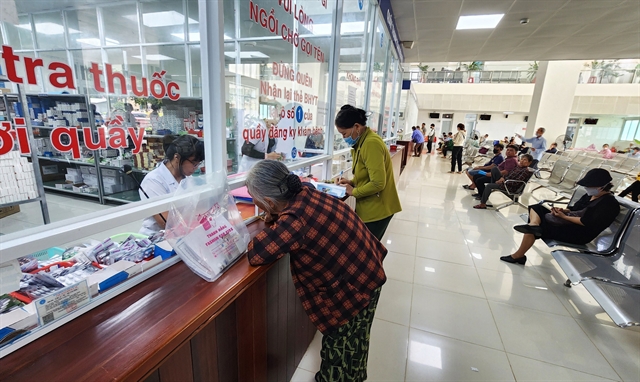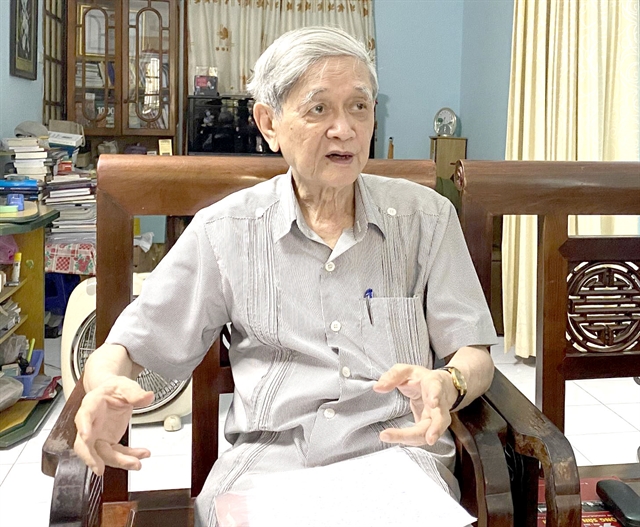 Society
Society

To this day, the 80-year-old former General Director can excitedly recall the historic moments the agency documented.

|
| Hồ Tiến Nghị, 80, former General Director of the Vietnam News Agency.— VNA/VNS Photo |
HÀ NỘI — The years haven't dimmed Hồ Tiến Nghị's memories of the heroic and unforgettable years of the Vietnam News Agency.
To this day, the 80-year-old former General Director can excitedly recall the historic moments the agency documented.
Nghị vividly recalls two unforgettable memories in particular, when the agency aired the full text of the Declaration of Independence, which was read by late President Hồ Chí Minh at Ba Đình Square on September 2, 1945, and when the agency was named by the President on August 24, 1945.
Nghị said at that time the agency had no means with which to deliver the news of the declaration to the world.
The technical staff of the agency had to collect materials to repair an old radio station to air the Declaration of Independence on September 15, 1945.
The agency aired the declaration in Vietnamese, French and English. Trần Văn Chương, an intellectual in Thừa Thiên Huế Province, personally translated and read the English version, Nghị said.
The French version was translated and read by Dương Thị Duyên, the daughter of the late Professor Dương Quảng Hàm - the first principal of the prestigious Chu Văn An High School, who died for the national cause in the first days of the war of resistance against the French in late 1946.
It was a proud milestone of the agency in its journey together with national history, Nghị said.
That was why the agency took its date of establishment as September 15, 1945, he said.
Nghị also said on August 24, 1945, then Party General Secretary Trường Chinh and comrade Nguyễn Lương Bằng welcomed President Hồ Chí Minh, who returned to Hà Nội from the Việt Bắc region (which includes the northwestern provinces of Hà Giang, Tuyên Quang, Cao Bằng, Bắc Kạn, Thái Nguyên and Lạng Sơn).
By chance, Bằng brought a draft on the establishment of the Information and Propaganda Department, including press agencies, compiled by Trần Kim Xuyến – who later became the first general director of the agency, to submit to President Hồ Chí Minh.
The President read the draft very carefully, especially the paragraphs mentioning the news unit.
“The unit is doing well and quickly, it already compiled domestic and international news since August 23,” he said, adding that the unit should have a name.
Then he picked up a pen to write the name Việt Nam Thông Tấn Xã (Vietnam News Agency) on the draft. The President explained that the word xã (agency) means a large ministry.
The first general director
Trần Kim Xuyến, known as Việt Nam’s first martyr journalist, was the first leader of the Vietnam News Agency.
Born in 1921 in Hương Sơn District, Hà Tĩnh Province, Xuyến was appointed Deputy Director of the Ministry of Home Affairs’ Việt Nam Information Department after the 1945 August Revolution. He was in charge of the Vietnam News Agency at the time and was also a deputy of the first National Assembly.
When the resistance war against French colonialism broke out, Xuyến was responsible for directing the relocation of all technical facilities and important documents of the agency to a safe area far from Hà Nội. Then the facilities and documents would be brought to Việt Bắc to serve the leadership of the Party and President Hồ Chí Minh during the war.
On March 3, 1947, when Xuyến heard the agency’s radio station in Trầm Pagoda, in Hà Nội’s Chương Mỹ District had been attacked, he rode his bicycle out there to direct staff to hide documents. He was hit by a bullet of a French soldier after he had finished hiding the documents. He died that day, at the age of 26, becoming the first revolutionary journalist to die in battle.
Nghị said when hearing of Xuyến’s death, President Hồ cried because he felt very sorry for the young and talented officer.
Unforgettable years
Nghị said in the 1960s, after experiencing some training courses on journalism, Nghị and his colleagues began the task of spreading the revolutionary spirit in both the north and south.
While the north was vibrant with a movement to promote the construction of socialism as a solid foundation for the southern revolution, the south experienced many unique political upheavals and revolutionary events to create the first steps for the final victory that took place on April 30, 1975, he said.
At that time, domestic information was hard to come by and broadcast and most senior leaders had to refer to world news from the Ministry of Foreign Affairs, he said.
In response to the situation, under the direction of Nguyễn Như Kim, head of the reference information department under the agency’s Southern Editorial Office, Nghị and his colleagues proposed to the agency’s leader of the first quick radio news bulletin.
At first, the news bulletin initially focused on domestic news, with a length of about 3-4 pages; aired three times a day in the morning, noon and evening, he said.
Then the agency improved it by delivering more world news, he said.
The news bulletin was highly appreciated by President Hồ, the Party, the Government and research agencies and became an indispensable broadcast for leaders and researchers, he added.
During the 1968 Offensive, also known as the Mậu Thân General Offensive, the agency continued producing the World Reference Bulletin. It became one of the agency’s strategic research documents, he said.
On April 30, 1975, the headquarters of Vietnam News Agency at No 5 Lý Thường Kiệt Street had the honour of broadcasting news to the whole country about the historic victory of the Hồ Chí Minh campaign, he said.
Nearly the entire population of Hà Nội flocked to the headquarters to read and hear the news of victory delivered from the battlefield.
The people covered the roads from the headquarters to the Hà Nội Opera House to celebrate together, he said.
“That is the moment every staff of the Vietnam News Agency at that time could not forget,” he said. — VNS




